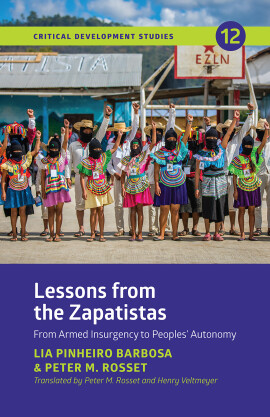
The Amazon in Times of War
The Amazon in Times of War presents both direct and indirect evidence showcasing the deliberate state policies behind the violence and devastation inflicted upon the Brazilian Amazon and its inhabitants. The collection features firsthand accounts detailing not just physical assaults, but also economic and institutional harm. The essays traverse diverse themes while adhering to a chronological sequence, zeroing in on a pivotal period commencing in 2018. In November of that year, following a second electoral round, Jair Bolsonaro assumed the presidency of an already fragmented nation. The world observed in astonishment as a relatively obscure conservative federal deputy, a former army captain with fervent neoliberal inclinations, rose to helm the largest country in South America. That menace became a calculated political agenda aimed at the obliteration of the world’s largest biome and its peoples, which encompasses nine South American nations. His forthright rhetoric strikingly echoed that of his North American counterpart, leading the media to dub him the “Trump of the Tropics.”
Series: Latin America Bureau Books
Published: 2024
Pages: 222
eBook: 9781788534390
Paperback: 9781788534376
| Foreword by John Hemming | |||
|---|---|---|---|
| Introduction | |||
| Part 1 – The Amazon in Times of War | |||
| 1. Environmental Fascism is Haunting the Amazon | |||
| 2. The Fire Balance Sheet | |||
| 3. A Brief Overview of Violence in the Amazon | |||
| 4. The Year of Killing | |||
| 5. Two Men Missing in the Amazon’s ‘Wild West’ | |||
| 6. ‘Letting the Herd Through’: Changes in Environmental Laws During the Pandemic | |||
| 7. Will the Amazon Rainforest Become a Commodity? | |||
| Part 2 – The Amazon and the Pandemic | |||
| 8. Hunger in the Amazon – The Invisible Companion of Covid-19 | |||
| 9. Deregulation and Deforestation Fuel the Pandemic in the Amazon | |||
| 10. Healthcare Means Going to the Community | |||
| 11. Brazil’s Yanomami People: Silence, Devastation and Fear | |||
| 12. Above the Marombas: The Pandemic in the Amphibious Amazon | |||
| 13. The Amazon and the Enigma of ‘Pure Luck’ | |||
| Part 3 – Beyond War: Life in the Amazon | |||
| 14. A Paradise Under Suspicion | |||
| 15. Only a Global Coalition Will Save the Indigenous Peoples of the Amazon | |||
| 16. Amazônia Redux: A Re-evaluation of Urgent Needs | |||
| 17. Stepping Softly on the Earth | |||
| 18. COP26: Cognitive Dissonance | |||
| 19. Another Brazil is Possible | |||
| 20. Epilogue: The Amazon Is Still At War | |||
| Afterword: We Are All Amazonians by Scott Slovic |
'These essays situate the Bolsonaro period as one of acute disaster but hardly divergent
from the general thrust of Amazonian transformation a kind of alchemy of changing life
into dead commodities.'
Susanna Hetch, University of California, Los Angeles
'These essays are fresh and heartfelt and together are a powerful call for humanity to heed
the voices of Indigenous peoples in the Amazon, to learn from them, and to act now.'
Fiona Watson, Survival International
'This book is vital reading for anyone engaged by the hauntings and hopes, the fears and
promise that suffuse Earth’s greatest tropical forest.'
Rob Nixon, Princeton University
'The Amazon in Times of War is a must-read for all who care about the future of the
rainforest — and planet Earth.'
Scott Wallace, author of The Unconquered: In Search of the Amazon’s Last
Uncontacted Tribes
'Colón, through his compelling images and testimonials from the Amazonian peoples, has
exposed to humanity the tragedy of the Amazon’s destruction at the hands of the most
nefarious interests of logging companies and garimpeiros, associated with multinational
corporations and the blind pursuits of global capitalism.'
Enrique Leff, National Autonomous University of Mexico
Marcos Colón is the Southwest Borderlands Initiative Professor of Media and Indigenous Communities at Arizona State University’s Walter Cronkite School of Journalism and Mass Communication. His research focuses on Brazilian literary and cultural studies, with a particular emphasis on the Amazon, Indigenous studies, and representations of natureculture in documentary film and world cinema.
Anthropology’s Philosophy
Rhythm
Harris, Mark
2025
https://doi.org/10.1007/978-3-031-83819-4_30 [Citations: 0]




